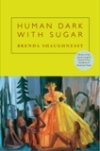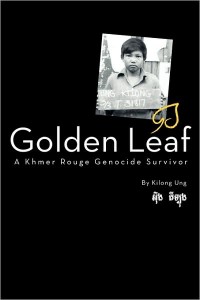
By Laura Grimes
Wordstock is all about community. It’s about taking the very private act of reading and celebrating it with a giant public festival that attracts thousands of people. It’s a shared experience of language. It’s stories that connect people.
Over two packed weekend days at the Oregon Convention Center, it was a treat to hear one writer after another and glean their personal experiences. But the stories that stand out for me the most were in the first two hours.
I arrived on Saturday right at 10 a.m. when it opened. I hadn’t planned to be an eager beaver, but The Large Large Smelly Boy had to be somewhere and Mr. Scatter dropped me off.
The readings and panels hadn’t started yet so I cruised the aisles. I nearly passed by the booth for Title Wave, the store that sells books that have been withdrawn from the Multnomah County Library system, but a cover caught my eye. I had been helping the Large Large Smelly Boy look for it at home just two nights before. I walked over to the shelf.
A clutch of five volunteers were bunched in the middle and one whispered excitedly, “We have a customer!”
I turned and smiled. “Oh, I give you guys so much money already.” I pointed to a hardback by T.A. Barron, one in the Merlin series that the LSBs have been hot and cold about. “I probably bought this book from you and then returned it. That’s a slight exaggeration, but not much.”
One of the volunteers replied, “Oh, just you wait until you volunteer!”
The LSBs and I go to Title Wave now and then, but especially at the beginning of every summer to stock up on books for long car trips. Someone once told me how she would get a stack of cheap used books when her kids were little. And then throughout the summer, when they finished them they would leave one after another behind for someone to find. Campgrounds. Laundromats. Ever since, I’ve loved that image of peeling off books like the pages in a tablet.
*
I turned away from the beat-up covers and — oh, terrific juxtaposition — Copper Canyon Press was right next door.
I have surreptitiously and covetously noodled around on the website of the eminent publisher of fine poetry books for a few years. I am often on the Olympic Peninsula and have more than once considered veering over to Port Townsend, Wash., where the press is located, just to knock on the door. And here they were, even eager to see me as they finished setting up.
 W.S. Merwin. Pablo Neruda. I picked up a slim volume. Human Dark With Sugar by Brenda Shaughnessy. I opened it.
W.S. Merwin. Pablo Neruda. I picked up a slim volume. Human Dark With Sugar by Brenda Shaughnessy. I opened it.
“That’s my favorite book!”
As if I’d pressed a button, a warm, friendly voice called out. I looked up and a young man walked toward me, beaming, the book drawing him like a magnet.
“Why?” I asked.
“She’s young. She writes about a lot of things that other people are afraid of. Like sex. I love the way she puts words together that you just wouldn’t expect. And the line breaks … oooh!” He let out a little exhulted moan.
“I read it and think, ‘Yeah, I totally get this,’ and then she’ll break the line a certain way and I go, ‘Wow, I wouldn’t have thought of that, but that totally makes sense.’ ”
His favorite poem?
I opened up the book to the contents page. He ran his finger up and down the list and stopped.
“It used to be ‘Why Is the Color of Snow?’ Isn’t that a great title? The book title comes from a line in the poem. But now my favorite is … ” his finger roved again … “this one.” He pointed. “Old Bed.”
I turned to Page 15. He stood there patiently waiting for me to read it.
How could I possibly read that poem on command in front of a young man I’d never met and really take it in? Swarms of people were everywhere. Snippets. This booth. That booth. Music came from who-knows-where. Perpetual notches from what sounded like a roulette wheel. Voices. Humming. Chattering. Phone talks. Snatches. Fast-paced freeze frames. Snap. Snap. Snap.
Poetry. It’s perfect and not perfect to read while standing in the middle of a busy convention hall. The poem is short, so it’s just the right brain span, but not perfect to delve into, pick up nuances, and savor. It turned out that didn’t matter.
As I skimmed the poem, the young man looked at the words with me and pointed and as naturally as breathing he let out a few little sighing moans that were barely audible but unmistakable. “Mmmm. Mmmm.”
Old Bed
Coil of metal, coin of wood, two-headed
and soft in the middle. This bed has got to go.
This pink, synthetic honey spoiling
the tea of my life, already steeped into a stupor.
Why must everybody sleep
so long, so often, every night all night,
indulgent as disco people in the ’70s?
It’s like a fad now faded, trendy and cheap.
Sleep: if everyone put a spike
through their heads and wore paper pants
to work I’d be the one to say “No thanks.”
I’m not so insecure that I need
to be ridiculous, to dream, to belong
to the smiling group, like anyone.
I don’t need a cult of sleep to tell me to die
every night. I don’t trust the world
not to come in and steal my stuff every
night. It’s this “every night” business
I have issues with. I can’t waste another
third of my life drooling, snuffling,
spilling secrets from my honking mouth.
I’m selling the bed.
Sometimes, awake, listening to you talk
in your sleep, the sunrise would steal
in and cover this bed with a thick spread
of orange cheese. It was unreal, awful,
and I was too warm. I’d turn on the bluish
light to cool down. I think I woke you up.
It seemed our legs were tangled but how
tangled could they be, four numb posts
holding our bodies up against the large
dark night of each other? That weight.
I bent myself in two, in this bed. Too late.
I’m tired of it, awake with it. It’s dead.
— Brenda Shaughnessy
from “Human Dark With Sugar,”
Copper Canyon Press
*
Renee Watson delivered the most polished performance I heard at the festival with a riveting reading of her poem “Where I’m From” on the Target Children’s Stage. She’s an accomplished performer and writer and deserves to be heard on a bigger stage.
Watson has two children’s books that recently came out. A Place Where Hurricanes Happen is a picture book about children dealing with the aftermath of Hurricane Katrina. What Momma Left Me is a young adult novel about a 13-year-old girl who loses her parents and has to figure out how to live with her grandparents.
*
Because Watson held my attention, I helicoptered in late to a panel of three authors who were discussing how they wrote about war.
 Kilong Ung, who learned to speak English in high school, talked articulately about the extremely painful process of writing his book, Golden Leaf: A Khmer Rouge Genocide Survivor. As a child, he nearly starved in a labor camp. His grandmother, parents, youngest sister and six other family members died.
Kilong Ung, who learned to speak English in high school, talked articulately about the extremely painful process of writing his book, Golden Leaf: A Khmer Rouge Genocide Survivor. As a child, he nearly starved in a labor camp. His grandmother, parents, youngest sister and six other family members died.
Ung would set aside seven hours to write and sometimes he would produce only a single word. He tried writing alone in a room, but found the horrific memories too haunting and he couldn’t focus, so he tried writing in public places. While he was working in a Starbucks he started to cry, but then after a while realized a lot of people were around. He told himself he had to buck up, and he went into the bathroom, washed his face, came back out and ordered an Americano.
Ung told the story, which you can find here, about how he and his sister returned to Cambodia 20 years after escaping. He said in all those years he had fantasized about revenge. During his visit, a childhood friend came to him and mentioned a man who had been brutal to Ung’s family. The friend said he knew where the man lived and for $800 he would kill him for him. He would torture him and kill him or Ung could if he wanted to.
Ung chose to walk away. Now he dreams of building schools in Cambodia and elsewhere.
*
Snippets of stories. Thanks to this public forum, these are just a few of what I collected. Language can spin in such interesting ways, and it can depend on what you catch when.
Near the very end of the festival, Kevin Smokler, the CEO of booktour.com, said it best. “It’s all about being part of the conversation.”